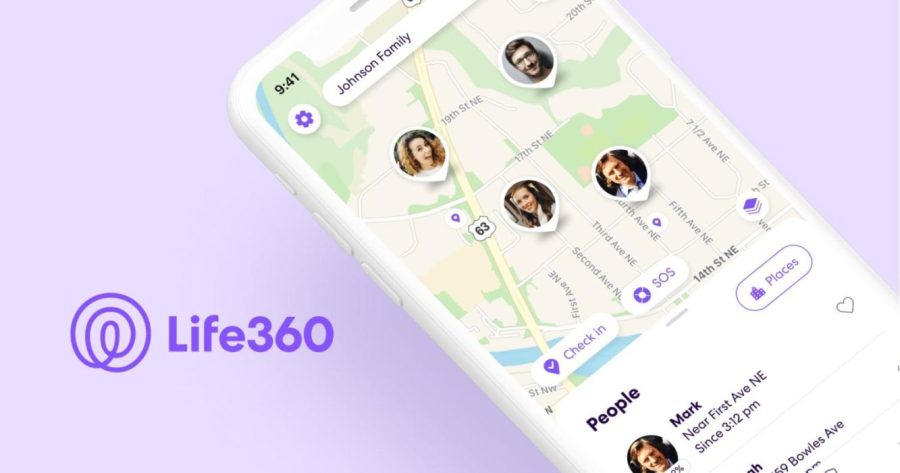Parents vs. Life 360
September 29, 2022
The bubbles greet you as you press on the multi-colored squiggles floating on your phone’s home screen. Happy, smiling faces — and their locations — flash onto the display. Mom, who is driving to school to pick you up. She’s two minutes away. Your annoying little brother, who is at his middle school for soccer practice. He’s a mile away. You exit Life 360 and slip your phone back into your pocket, heading to the spot at the front of the school you always go to get picked up.
Maybe this is you. Whether you use Life 360, Find My or SnapMap, location tracking apps are common among students — and their parents. For example, over 70% of the Prospector staffers surveyed said they use location tracking apps with their families and friends. Popular family safety app Life 360 also has 38 million users all over the globe. With one swipe on your phone, you can effortlessly check that your family and friends are safe or contact emergency services if you are in trouble.
So why are people complaining?
Perhaps you have heard the stories of stalkers looking at people’s locations to find where they are or of parent-child relationships ruined by the parent’s obsession with knowing where their child is located. When information as sensitive as a person’s precise location is given freely without specific and firm boundaries agreed upon by all parties, parents can easily take advantage of access to their child’s location.
While remembering this, 86% of The Prospector in a survey of 21 staffers agreed that tracking apps are more beneficial than harmful, with the dissenting 14% arguing that it depends on each individual’s situation.
A staffer shared, “I think it depends on the relationship between the child and parent. Some parents use [tracking apps] to overbearingly control their kids’ lives and in instances such as these, it is obviously much more harmful. However, in my personal case, and I believe for most people, it’s simply a way for family members to stay connected and check in on one another.”
For many families, there is an aspect of safety with location trackers that cannot be ignored — for example, if someone is in danger, Life 360 has a function to alert their family members and emergency services. Location trackers can also quickly and conveniently soothe the anxiety of worried parents — and children — when their family members are too busy or forgetful to text.
In addition, people can use location tracking apps for many other purposes, such as estimating when a family member will pick them up from school or finding lost devices. A Prospector staffer shared how they once lost their phone at school and used a tracking app on their friend’s phone to find it — a more efficient alternative to backtracking one’s steps from the entire day. However, these beneficial features do not mean anything if there is a lack of mutual trust between the users.
Legally, minors do not have a right to privacy from their parents or guardians, exempting health information. Parents have a legal duty to control their children and essentially have the right to dictate their actions as long as it does not harm them. But short of physical abuse, the standard of what hurts a child is not much of a standard at all — it varies with family and culture.
Nonetheless, a lack of a child’s legal right to privacy does not change its essentiality in a healthy parent-child relationship. Privacy is vital for a child to develop responsibility and autonomy and crucial to building trust. While this may seem counterintuitive, especially to parents, children need space to explore their interests without the constant feeling of someone watching them. This need for privacy also applies to location — when parents obsessively check where their children are, children can feel mistrusted and doubted or grow more comfortable hiding anything they do not want their parents to know.
As a Prospector staffer noted, “[Forced use of location tracking apps] pushes the narrative that the child is not allowed to set boundaries with their family among other social- [or] emotional issues.” In addition, instead of encouraging openness and honesty, constantly checking location apps may cause children to feel the need to actively conceal their activity, which is arguably worse than not telling parents details the child is uncomfortable sharing. The mindset of having nothing to hide from one’s parents can only be created by building mutual trust over time — a reality that parents often overlook.
But the gray area with location tracking is that it is always present. With Life 360, for example, the free plan allows one to see the precise route for every member of their family over the past two days. With the paid plan, the app saves the data for thirty days. As long as you carry your phone, your family can see every move you make at any second of the day — they can even see the speed of the vehicles you are in. With this preciseness, setting up and enforcing boundaries for privacy can prove difficult.
Respect is essential to setting and maintaining these boundaries, and when one achieves this, location apps can be used to their intended use — the fullest of their potential. As long as both parties are comfortable with them, there is not anything inherently wrong with location tracker apps — they are helpful for safety, convenience and accountability. When used correctly and respectfully, the pros outweigh the cons.




